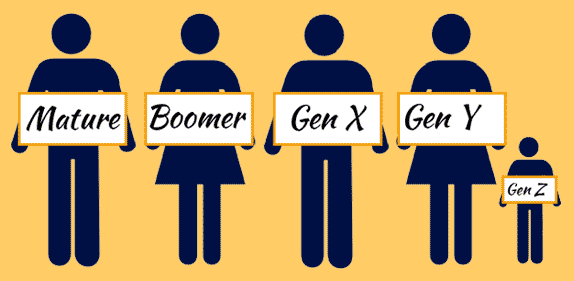Different online shopping habits of various Generations
 Everyone approaches online shopping differently, but were you aware that every generation has a different behaviour when it comes to shopping? Some generations are thrifty and don’t like to spend much money, while others live in the moment saying YOLO (for those who don’t know, that means you only live once).
Everyone approaches online shopping differently, but were you aware that every generation has a different behaviour when it comes to shopping? Some generations are thrifty and don’t like to spend much money, while others live in the moment saying YOLO (for those who don’t know, that means you only live once).
As a result, marketers must cater for these different behaviours and with the world of online shopping that can be both trickier, and easier at the same time.
For starters, millennials and baby boomers are living in smaller spaces which means they don’t need as many items for their home as previous generations. They can get by with much fewer items for their home.
That said, there is another side to the story. Millennials are moving out of the home and must, therefore, buy furniture for their new apartment or house, most likely a house though if they live in a major city in Australia.
With the rise of fast fashion and cheap outlets like Zanui, people do not want to spend huge amounts on furniture and will often hunt around for the cheapest item they can find.
There is, however, an opportunity for retailers to capitalise on this and market their products towards these groups.
Baby boomers are willing to spend money in other areas.
According to research, they’re investing money into homewares and travel, so there are opportunities for online stores to promote these products to a greater extent than they presently are. That’s where the real opportunity lies.
Marketers need to take a different approach when dealing with millennials. Millennials have a much higher disposable income from other generations and as such, they have unsurpassed spending power.
With that though comes increased demand. Millennials know what they want and given they’ve all grown up with the technology they’re able to research the best deals online so they have all the facts in front of them prior to shopping.
Despite millennials wanting the best price around and despite the rise of fast fashion, they are loyal to their preferred brands when shopping.
Generation Z, the generation born after the mid-1990s, although like other generations there is no particular date, are less loyal to their brands. In fact, they don’t even have “their brands”. They are much more about price and will switch brands if they find cheaper elsewhere.
With increasing numbers of Generation Z consumers, marketers are faced with a real challenge. Once upon a time, it was possible to market to your consumers based on loyalty and relationships. Anyone in sales or who have known people who have sold products knows the importance of relationship building, and that you must develop a relationship with your consumers. That relationship can be performed in numerous ways, including through discounts for loyal customers, special products and rewards for loyalty etc.
As mentioned though, it’s harder to reach Generation Z this way so marketers must look to other ways.
When making purchasing decisions they consider online reviews and like to know what their peers are saying about brands or products. Despite them not being loyal to their brands, trust is a big factor that will influence their shopping habits. They are not fast to trust strangers and unsurprisingly they hate being lied to.
It has been well documented in the past that millennials do not like being tied down. While other generations liked the security and didn’t mind being locked into contracts, Millennials like to have the freedom to move around and shop for the best deal. That’s much harder to do if you’re locked into a two-year contract.
Millennials know all too well that they may miss out on a better deal if they are locked into a contract and that is why they avoid them. Millennials like to maintain freedom and the ability to choose.
That is why online shopping is fantastic, it allows consumers the choice and ability to conduct prior research before they buy a product. They can become fully informed without being locked in, and brands don’t lose out on possible consumers.

4,812 Responses to "Different online shopping habits of various Generations"